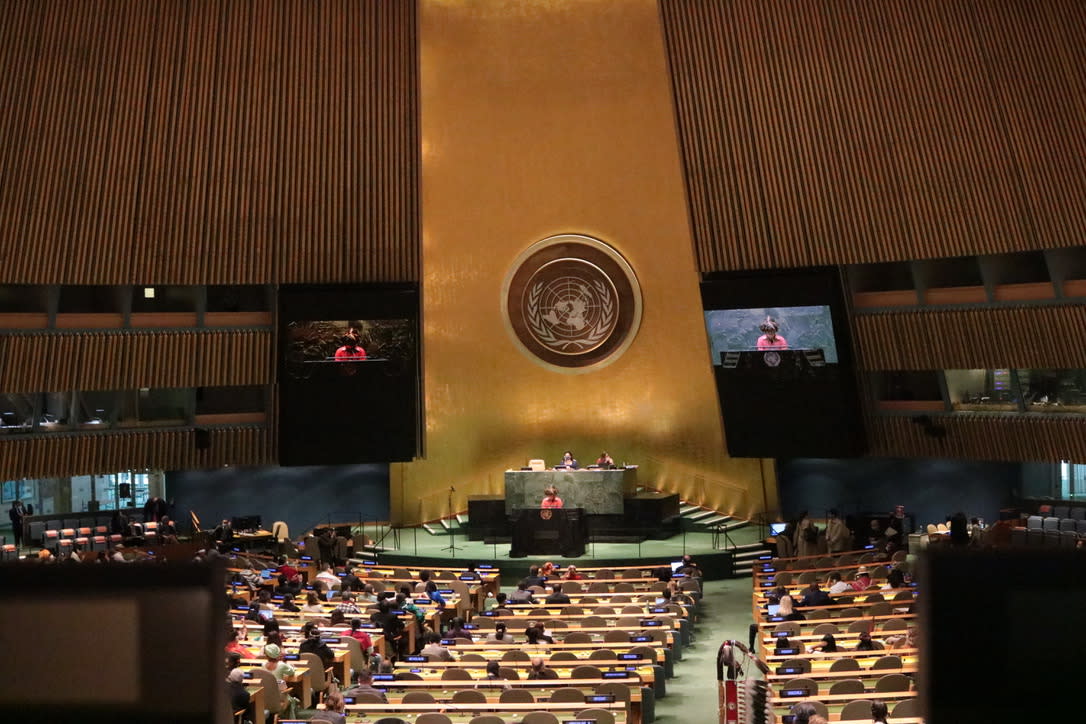From the United Nations to Our Homes, Indigenous Native Languages Should Take High Priority

Opinion. On the first day of the 21st United Nations Permanent Forum on Indigenous Issues (UNPFII) in New York last week, with delegates from around the world dressed in their colorful Indigenous attire, Cherokee Nation Chief Chuck Hoskin Jr. spoke about the preservation of the Cherokee language. He was there among thousands of other Indigenous people to set goals to preserve and push for implementation of Indigenous rights around the world.
As the leader of one of the largest American Indian tribes in the United States, Hoskin has been a vocal advocate for preservation of the Cherokee language. Even before the loss of over 50 fluent Cherokee language speakers during the COVID-19 pandemic, Hoskin was concerned about the potential loss of the Cherokee language.
“The greatest enemy of the Cherokee language right now is the passage of time and the fragility of human lives,” Hoskin said at the United Nations. “We have no time to lose.”
Hoskin speaks frequently about the cultural identity of Cherokees across the tribe’s 7,000-square-miles of tribal lands in Oklahoma and in Cherokee homes. That identity, he says, is fundamentally rooted in the Cherokee language.
Chief Hoskin addressed the issue in a guest opinion published by Native News Online last December: “Today we have less than 2,000 fluent Cherokee speakers remaining, who have an average age of 70 years old. They carry in their hearts and minds our most precious cultural treasure. They are the vital links in that unbroken chain to our past. They are indispensable to our effort to save the Cherokee language in the present. But time is working against us.”
In December, first lady Jill Biden and Interior Secretary Deb Haaland (Laguna Pueblo) visited the Cherokee Immersion School on the Cherokee Nation in Tahlequah to see the program that allows students to converse and write in the Cherokee language. The good news is they reported the Biden Administration has established a Native Language Workgroup of the U.S. Department of Education, the U.S. Department of Health and Human Services, and the Bureau of Indian Education to make annual reports on their progress.
Native News Online Senior Reporter Jenna Kunze covered the UNPFII at the United Nations this past week.
With 2022 being commemorated as the International Year of Indigenous Languages, Kunze reported that Monday afternoon’s U.N. session centered on Indigenous languages. In a subsequent conversation I had with her, she told me the individuals who spoke on the importance of preserving Indigenous languages did so in the language of those who colonized their countries.
In addition to Chief Hoskin, people from Canada, Mexico, New Zealand, the Caribbean; Nepal and Bolivia and Arizona; Finland and Peru; Guyana, Australia, and the Ukraine’s Crimea all spoke.
Kunze was supplied with a headset to hear the speakers being interpreted into English from Russian, Chinese, Arabic, Spanish, and French in the language of their colonizers.
Indigenous languages were described as more than words. They are a birthright, the most direct expression of a culture, carrying the eternal ethical values of our ancestors. If lost, our languages directly impact so many aspects of our lives, including Indigenous community health.
Kunze also reported this eye-opening factoid from the United Nations: almost all of the world’s approximately 6,700 languages are spoken by only three percent of the population, primarily the Indigenous peoples. Estimates say that 95 percent of the world’s languages will become extinct by the end of this century.
On Thursday, I attended the Native American/Indigenous graduation celebration at Grand Valley State University in my hometown of Grand Rapids, Mich. where I serve on the university’s Native American Advisory Council (NAAC). During the event, fellow NAAC members spoke about the need for Native American graduates to be involved with their local tribal communities now that they are equipped with their degrees. They were encouraged to learn to speak our Native languages, which we were deprived of because of Indian boarding schools and other efforts to assimilate Native Americans.
It dawned on me what is being done at the United Nations in the Indigenous Forum touches all of Indian Country. As I sat there, I reflected on Chief Hoskin speaking about preservation of Indigenous languages on the world stage and the positive impact that our Native languages can have in shaping our homes, as well as our futures.
It is nice to know there are Native Americans from Indian Country fighting for our rights that impact us all in our daily lives.
About the Author: "Levi Rickert (Prairie Band Potawatomi Nation) is the founder, publisher and editor of Native News Online. Rickert was awarded Best Column 2021 Native Media Award for the print\/online category by the Native American Journalists Association. He serves on the advisory board of the Multicultural Media Correspondents Association. He can be reached at levi@nativenewsonline.net."
Contact: levi@nativenewsonline.net

